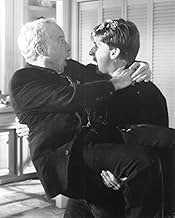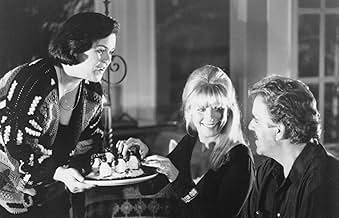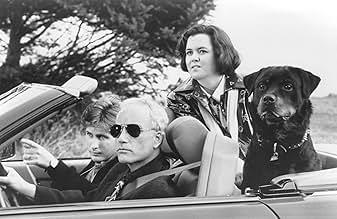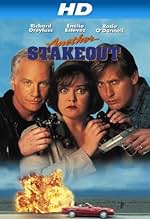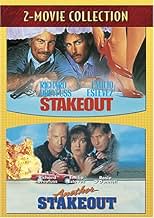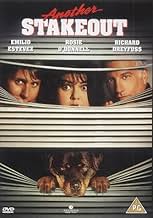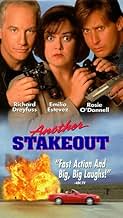PUNTUACIÓN EN IMDb
5,6/10
16 mil
TU PUNTUACIÓN
A dos detectives inmaduros se les une un molesto fiscal de distrito para vigilar una casa junto al lago donde se cree que se dirige un testigo de juicio de la mafia.A dos detectives inmaduros se les une un molesto fiscal de distrito para vigilar una casa junto al lago donde se cree que se dirige un testigo de juicio de la mafia.A dos detectives inmaduros se les une un molesto fiscal de distrito para vigilar una casa junto al lago donde se cree que se dirige un testigo de juicio de la mafia.
- Premios
- 1 nominación en total
Gene Ellison-Jones
- Vegas Police Captain
- (as Gene Ellison)
J.R. West
- Vegas Investigator
- (as J. R. West)
Argumento
¿Sabías que...?
- CuriosidadesMadeleine Stowe only appears in the film in a cameo role due to scheduling conflicts with "Bad Girls"
- PifiasAt casino, during opening scene, you can clearly hear the worker vacuuming, but the vacuum bag is deflated.
- Citas
Detective Bill Reimers: I've had this moustache for thirteen years. How long have you had yours?
- Banda sonoraCome On Get Happy
Written by Wes Farrell (as Wes Ferrell) and Danny Janssen
Reseña destacada
"That's it, nobody calls me Ed McMahon!"
"Another Stakeout" was six years in the waiting. After the first film, "Stakeout," made a huge splash at the box office in 1987 (the same year another cop-buddy film came out--can you guess which one?), everyone anticipated an unnecessary--but perhaps funny--sequel that would inevitably result after box office earnings were tallied up by film executives in an office somewhere.
Alas, the six years passed, and we got...this mess?
Richard Dreyfuss and Emilio Estevez reprise their roles as stakeout cops who get paired with a new partner in this watered-down sequel. The new partner is played by Rosie O'Donnell, who is so startlingly unfunny in this it almost makes you involuntarily switch off the television as soon as you see her chubby face smiling at you.
The story starts with a bang--literally--as a trial witness being protected by the CIA is unsuccessfully assassinated--and by that I mean: They die, she lives. What a surprise. (This is the type of scene where the villain is able to blow up a house but the witness just happens to be taking a stroll outside as it happens--or something like that--preventing her from dying along with the other agents who were previously protecting her. This type of thing was spoofed greatly in the truly underrated "Last Action Hero." It's not a joke in "Another Stakeout.") Unfortunately for the United States, the trial witness never returns--she runs away and doesn't let anyone know where she is. Afraid she may be in danger, afraid to lose a star witness, and believing that she might try to contact old friends, the gruff chief of police assigns the unlucky trio of Dreyfuss, Estevez and Donnell to watch the her old pals to see if she turns up.
She eventually does, of course, but first we get some painfully unfunny buddy-buddy moments between Dreyfuss and Estevez and O'Donnell. She brings a bunch of clothing and a dog with her. They don't like it. Har-har. This was used a bit better in "Spaceballs," in which Princess Vespa brought along that entire luggage through the desert (remember?). This is just a copy of that scene, minus the punch line.
Estevez also shaves his mustache, which is supposed to be a type of sacred moment and is referenced at least ten times throughout the film (he goes to stroke his mustache, he complains about chopping it off, Dreyfuss complains about it, etc.). But for heaven's sake, he's only been in one film so far--we've only seen the mustache once--so a better thing to do would have been this: make a few more sequels and, when the last entry comes, have him shave it off. By then the audience realizes that his mustache is part of him, and that losing it is like losing part of his soul.
But I'm glad they didn't make any more than one sequel.
One of the things that kept the "Lethal Weapon" franchise going was the fresh ideas, fresh buddies, and fresh scripts. (Great actors never hurt an action comedy, either.) The "Stakeout" franchise--which didn't even last long enough to spawn more than one sequel--tries to copy this formula but isn't sure how. The introduction of Joe Pesci in "Lethal Weapon 2" was great because he thereby became the Third Stooge, whereas O'Donnell's entry into the series is nothing but a humiliating reminder that talk show hosts can't always act in front of a camera and maintain the same type of humor they may (or may not) exhibit on their (awful) TV "talk show." (Which is, by the way, consumed of entirely staged so-called "interviews.")
And whereas Pesci, as Leo Getz, added a type of silly vibe to the "LW" series, O'Donnell just seems like a carbon copy clone of Estevez from the first "Stakeout." Dreyfuss didn't like him at first, and--guess what--they suddenly became best buds. The same thing happens in the sequel, much to the audience's chagrin.
Of course, "Lethal Weapon" and its sequels were never more than a few years apart (the first coming out in 1989, two years after the original). But "Stakeout" had six years to make a respectable sequel, and it fails. It fails the same way that many prolonged sequels do. But, for once, it's not because the audience has forgotten the original film--it's because the audience is fed up with the same routine.
The film was directed by John Badham, which is surprising, since he's a talented director ("Saturday Night Fever," "The Hard Way," "Stakeout"). Here he jumps through all the hoops, turning his own series into a pale retread of the original--only watered down: minus the violence, language, nudity, and humor. I'm not saying a movie has to be R to be funny. But if you've got a sequel to an R-rated movie like "Stakeout" and you decide to turn its sequel into a cutesy-tutesy children's entertainment program, you'd better advise the audience before they sit down expecting something funny and fresh.
What a disappointment.
2/5 stars.
- Emilio Estevez saying the funniest line from a rather dry sequel
"Another Stakeout" was six years in the waiting. After the first film, "Stakeout," made a huge splash at the box office in 1987 (the same year another cop-buddy film came out--can you guess which one?), everyone anticipated an unnecessary--but perhaps funny--sequel that would inevitably result after box office earnings were tallied up by film executives in an office somewhere.
Alas, the six years passed, and we got...this mess?
Richard Dreyfuss and Emilio Estevez reprise their roles as stakeout cops who get paired with a new partner in this watered-down sequel. The new partner is played by Rosie O'Donnell, who is so startlingly unfunny in this it almost makes you involuntarily switch off the television as soon as you see her chubby face smiling at you.
The story starts with a bang--literally--as a trial witness being protected by the CIA is unsuccessfully assassinated--and by that I mean: They die, she lives. What a surprise. (This is the type of scene where the villain is able to blow up a house but the witness just happens to be taking a stroll outside as it happens--or something like that--preventing her from dying along with the other agents who were previously protecting her. This type of thing was spoofed greatly in the truly underrated "Last Action Hero." It's not a joke in "Another Stakeout.") Unfortunately for the United States, the trial witness never returns--she runs away and doesn't let anyone know where she is. Afraid she may be in danger, afraid to lose a star witness, and believing that she might try to contact old friends, the gruff chief of police assigns the unlucky trio of Dreyfuss, Estevez and Donnell to watch the her old pals to see if she turns up.
She eventually does, of course, but first we get some painfully unfunny buddy-buddy moments between Dreyfuss and Estevez and O'Donnell. She brings a bunch of clothing and a dog with her. They don't like it. Har-har. This was used a bit better in "Spaceballs," in which Princess Vespa brought along that entire luggage through the desert (remember?). This is just a copy of that scene, minus the punch line.
Estevez also shaves his mustache, which is supposed to be a type of sacred moment and is referenced at least ten times throughout the film (he goes to stroke his mustache, he complains about chopping it off, Dreyfuss complains about it, etc.). But for heaven's sake, he's only been in one film so far--we've only seen the mustache once--so a better thing to do would have been this: make a few more sequels and, when the last entry comes, have him shave it off. By then the audience realizes that his mustache is part of him, and that losing it is like losing part of his soul.
But I'm glad they didn't make any more than one sequel.
One of the things that kept the "Lethal Weapon" franchise going was the fresh ideas, fresh buddies, and fresh scripts. (Great actors never hurt an action comedy, either.) The "Stakeout" franchise--which didn't even last long enough to spawn more than one sequel--tries to copy this formula but isn't sure how. The introduction of Joe Pesci in "Lethal Weapon 2" was great because he thereby became the Third Stooge, whereas O'Donnell's entry into the series is nothing but a humiliating reminder that talk show hosts can't always act in front of a camera and maintain the same type of humor they may (or may not) exhibit on their (awful) TV "talk show." (Which is, by the way, consumed of entirely staged so-called "interviews.")
And whereas Pesci, as Leo Getz, added a type of silly vibe to the "LW" series, O'Donnell just seems like a carbon copy clone of Estevez from the first "Stakeout." Dreyfuss didn't like him at first, and--guess what--they suddenly became best buds. The same thing happens in the sequel, much to the audience's chagrin.
Of course, "Lethal Weapon" and its sequels were never more than a few years apart (the first coming out in 1989, two years after the original). But "Stakeout" had six years to make a respectable sequel, and it fails. It fails the same way that many prolonged sequels do. But, for once, it's not because the audience has forgotten the original film--it's because the audience is fed up with the same routine.
The film was directed by John Badham, which is surprising, since he's a talented director ("Saturday Night Fever," "The Hard Way," "Stakeout"). Here he jumps through all the hoops, turning his own series into a pale retread of the original--only watered down: minus the violence, language, nudity, and humor. I'm not saying a movie has to be R to be funny. But if you've got a sequel to an R-rated movie like "Stakeout" and you decide to turn its sequel into a cutesy-tutesy children's entertainment program, you'd better advise the audience before they sit down expecting something funny and fresh.
What a disappointment.
2/5 stars.
- John Ulmer
- MovieAddict2016
- 28 ene 2004
- Enlace permanente
Selecciones populares
Inicia sesión para calificar y añadir a tu lista para recibir recomendaciones personalizadas
- How long is Another Stakeout?Con tecnología de Alexa
Detalles
- Fecha de lanzamiento
- País de origen
- Idioma
- Títulos en diferentes países
- Another Stakeout
- Localizaciones del rodaje
- Empresas productoras
- Ver más compañías en los créditos en IMDbPro
Taquilla
- Recaudación en Estados Unidos y Canadá
- 20.208.496 US$
- Fin de semana de estreno en EE. UU. y Canadá
- 5.418.316 US$
- 25 jul 1993
- Recaudación en todo el mundo
- 20.208.496 US$
- Duración1 hora 48 minutos
- Color
- Mezcla de sonido
- Relación de aspecto
- 2.35 : 1
Contribuir a esta página
Sugerir un cambio o añadir el contenido que falta

Principal laguna de datos
By what name was En el punto de mira (1993) officially released in India in English?
Responde

